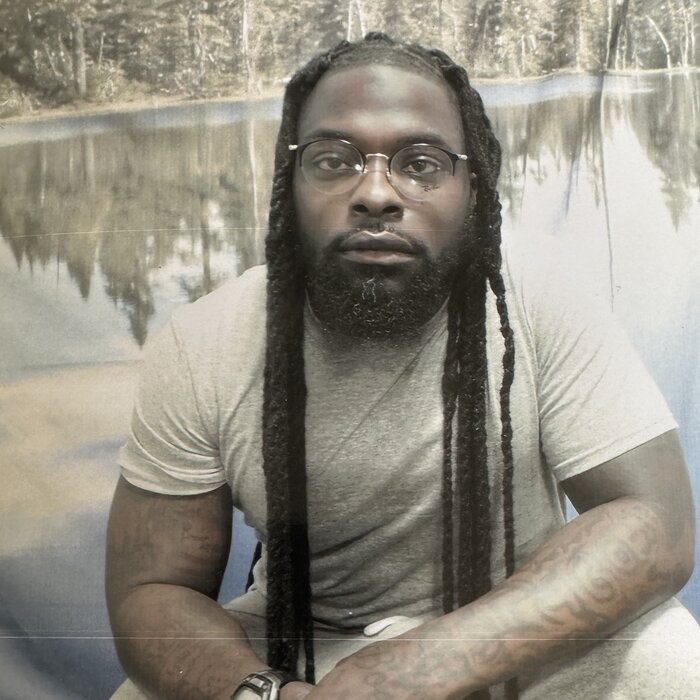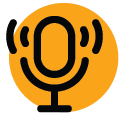My name is Carlos Marcell Jackson. I was incarcerated when I was 21 years old for aiding and abetting a murder. I’m now 39; I’ve been in prison 18 years.
A staff member in one of the prisons told me once that I could have done something with my life, and I often think about what my alternative might have been. But I come up with nothing. I never had the freedom to be a kid. My friends and the older dudes I looked up to were all on the streets; there’s not one I can recall making something productive out of their lives. They just cycled in and out of jail; most of them are dead today. Some of my best friends were killed right in front of me. My uncle was killed when his buddy shot him two times in the head in a dispute over $30. I was 10 or 11 at the time and I was in the back seat of his car when it happened. In fact, by that age, I knew more about guns and drugs than school. During my childhood, I was shot a total of five times myself.
A mother’s messy, complicated love
In my earliest years, I lived with my mother, April Jackson. (My father cycled in and out of jail; I never really knew him.) My mother lived the street life. She’s been off drugs for 15 years now, but when I was young, she spent her days smoking crack, drinking and sleeping with any man who would lie about being in love with her and provide what she needed to get high. Although a beautiful woman, my mother didn’t even know how to read. So, giving her body away was the only way she knew how to get by. She was always looking for the next high, even having sex with men in front of me.
Today, I know my mother loved me. In fact, it was love that drove her to drop me off with my father’s mother on Christmas Day when I was 4, and never return. She thought it would give me a better life. Instead, it opened the door to what every other man in my family knew: the streets.
My grandmother had two sons, and both abused crack. She was never into street life herself, but her second husband, the man I called my grandfather, was. He beat her regularly, only stopping due to old age.
Overall, I listened to my grandmother. It was my peers who were the negative influence. In junior high school, I got into street culture and everything that comes with it. Back then, I had a very bad temper because I couldn’t find my place in life, and I simply mirrored what I was exposed to. Except for times when I was sent to the juvenile detention center or group homes after getting in trouble, I was pretty much on my own, making one mistake after another. I was kicked out of school frequently and wouldn’t obey curfews.
The day that changed my life
When I look back at the day I committed my crime at the age of 21, I feel the worst type of pain. I not only played a role in taking someone’s life, I lost a friend over a misunderstanding. At the time, I didn’t understand the consequences of my actions. I simply imitated how I saw other people in the streets handle conflict.
When I was sent to prison, I encountered lots of challenges. I didn’t know how to handle where I was and I didn’t see any options for shaping a different future. So, I got into a lot of fights over things that had nothing to do with me. When you’re in federal prison, you’re expected to act in solidarity with the people in your “car” (some people would call it a gang). For me, that was the other people from DC. So, when anyone else from DC was targeted by another car, I was expected to defend him. If I didn’t, I’d end up hurt or dead. That’s the way cars work.
However, in 2008, I finally found the courage to change that dead-end course. The DC and Pennsylvania cars got into a big fight and a lot of people were stabbed or otherwise seriously hurt. I’m thankful nothing happened to me; I know I could easily have lost my life. I knew then that I needed to expect more of myself and that meant being more on my own. No one else had my best interests in mind. My parents are Muslim, but it was only then that I truly dedicated myself to Allah.
Another big step toward improvement was learning to read. (You read that right: I couldn’t read when I came to jail). I taught myself with the help of a cellie who had been in prison for 46 years. I am currently working to complete both my GED and the Bureau of Prisons’ signature rehabilitation program in the penitentiaries, called Challenge. I’ve already completed a range of other classes, ranging from geometry and world history to anger management and critical thinking.
A surprising mentor
One person who helped me long the way is Dr. J. Booker, a treatment specialist in the Challenge program. During my 18 years in prison, I’ve never encountered a staff member who has been as “hand’s-on” as he is. He conveys the feeling that he’s got our backs and will do whatever it takes to help us better ourselves and prepare to return to our communities. He constantly tells us we can achieve whatever we set out to do. It makes a huge difference when someone like that believes in you. But he also never lets us take the easy way out and blame our past mistakes on others.
When I was young, growing up in impoverished southeast DC, people told me that I was going to be just like my father and end up in prison. But Dr. Booker says he believes in me and got me to believe in myself. As a result, I’ve been doing everything possible to be a better me, and a lot of other people are recognizing the change – all because Dr. Booker showed me that it starts inside.
What’s sad is that Dr. Booker is the only staff member I can name who really cares. There should have been many more who were serious about readying us for re-entry. But lockdowns are easier for staff than offering genuine rehabilitation—that and giving us a TV, MP3 and a tablet that can be stocked with games (at a cost, of course). The result: We look up after 10 or 20 years and haven’t done anything to better ourselves. Yet when we recidivate, coming back to prison after being let out into the world, they point the finger at us.
Fortunately, I was assigned Dr. Booker. And now, my goals for the future are unlimited. I already have been offered two jobs, one with a private contractor doing carpentry and another with a cleaning service. But my ultimate goal is to start my own business, probably first in deliveries with box trucks, then maybe later in lawn care and landscaping, home maintenance for seniors, or in-home and online personal training. I also want to start a service that helps people in jail invest in their futures. Most people have a plan A and plan B, but I have plans A-Z. There’s just so much more to me than my past crimes!
Postscript: As for my mom, we are close now. Allah has blessed us and her life has taken a turn for the better – free of drugs. When she finally visited me while I was in the Hazelton prison complex in West Virginia, I cried like a baby. My dad is still in jail, but I have forgiven him too.




